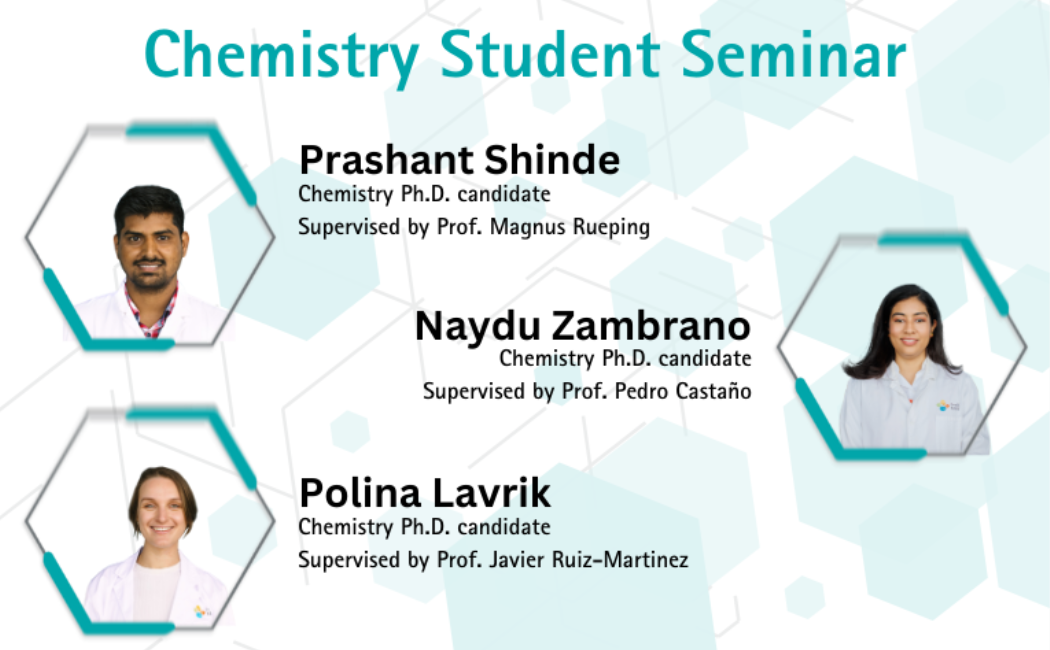
Abstract: An unconventional Ni-catalyzed cascade reaction of 2-alkynyl phenol ester with boronic acid incorporating an arylation of alkynes-induced acyl group migration to produce tetra-substituted functionalized alkenes in good-to-excellent yields with exclusive E-selectivity is herein presented. The reaction involves the generation of a nucleophilic vinyl Ni(II) species by the regioselective syn-aryl nickelation of an alkyne, which undergoes an intramolecular acyl migration with tether phenol ester to yield highly functionalized acyclic tetra-substituted alkenes. The steric and electronic trialkyl phosphine ligand is crucial for providing high regio- and stereocontrolled for efficient migratory carbo-acylation of alkynes. Besides, the synthetic utility of the obtained products is also demonstrated.
Bio: Prashant is currently a third-year Ph.D. student in the research group of Prof. Magnus Rueping in the PSE Division at KAUST. He obtained his Master's degree in Organic Chemistry from Pune University in India in 2014. From 2015 to 2017, he worked as a Research Associate in the R&D Department of Syngene International Limited, Bangalore, India. In 2018, he was a project fellow at the CSIR-National Chemical Laboratory, Pune, India. As part of his Ph.D. research, he is working on nickel catalysis and electrochemistry.
Abstract: Presently, heterogeneous catalytic conversions account for about 80 % of the conversions that take place in a conventional refinery. Understanding of reaction mechanisms (especially those involving heavy feedstock) and achieving a rational and optimized catalyst design strongly relies on achieving a detailed characterization of the entire reaction medium, including coke deposits. In addition, in the present energetic context, which aims at a circular economy and carbon neutrality, the requirements for attaining the chemical description of alternative feedstocks (i.e., waste plastics, biomass-derived feedstock), also become imperative. In this work we develop different multi-technique analytical workflows aiming at a complete chemical description of complex mixtures in thermal and catalytic conversion processes. Four relevant cases of study are presented: plastic/VGO blends, biomass-derived pyrolysis oils, deactivating coke species in the methanol-to-olefins (MTO) reaction and fouling deposits in refineries. The cases of study were chosen with the objective to cover complex mixtures from liquid to solid samples, test the performance of the different analytical techniques proposed, and deliver a general know-how of characterization. Analytical methods will be developed and adapted to every sample in order to generate comprehensive understanding of the relationship between samples composition and process parameters.
Bio: Naydu Zambrano received her bachelor's and MSc degrees in Chemistry from the Industrial University of Santander (UIS) in 2015 and 2018, respectively. She worked as a junior researcher in an Oil and Fuel company in Colombia, her main tasks included formulation, development, and evaluation of alternative ship fuel oils. In 2019 she was hired as a co-researcher in a collaborative project between UIS and Ecopetrol for the study of asphaltenes in Colombian heavy crude oils by NMR, FT-ICR MS, FT-IR, and Raman. In 2020, Naydu’s joined the petroleomic Lab at Colombian Petroleum Institute (ICP-Ecopetrol) as a researcher to study the molecular composition of crude oils. Currently, she is a Ph.D. student at King Abdullah University of Science and Technology (Fall 2020) under professor Pedro Castaño's guidance, working on FT-ICR MS as a tool for the characterization of complex samples.
Abstract: The production of ethylene, a crucial chemical in the petrochemical industry, typically involves the cracking of petroleum hydrocarbons, resulting in the unwanted byproduct of acetylene. Pd-based catalysts are commonly used to hydrogenate acetylene to ethylene, but they also tend to overhydrogenate ethylene to ethane due to the strong adsorption of ethylene on the surface atoms of Pd nanoparticles. To mitigate this issue, Pd single atom catalysts (SACs) have been shown to be more effective at preventing ethane formation during the acetylene to ethylene hydrogenation process. This study aims to investigate how the reaction performance and catalytic mechanisms of SACs are influenced by the reduction conditions used in the process.
Bio: Polina is currently in her third year of Ph.D. under the supervision of Professor Javier Ruiz-Martinez at KAUST Catalysis Center. In 2020, she completed her BSc followed by MSc in Physics from St. Petersburg State University in Russia. Her Ph.D. research focuses on the advancement of techniques that utilize electron energy loss spectroscopy methods, in conjunction with transmission electron microscopy, to perform in-situ characterization of catalysts with high energy and spatial resolution.